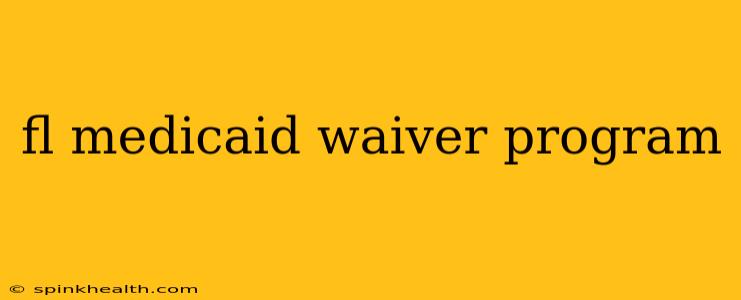Florida's Medicaid system offers a lifeline to many residents needing long-term care, but understanding the complexities of its waiver programs can feel like navigating a maze. This guide unravels the mysteries, offering a clear path through the process and answering common questions. Imagine this: You're a caregiver struggling to balance work and the needs of a loved one with disabilities, or perhaps you're facing the daunting reality of aging and needing assistance at home. Florida's Medicaid waiver programs could be your answer. But where do you start?
What are Florida Medicaid Waiver Programs?
Medicaid waiver programs are state-administered programs that allow states to provide services and supports to individuals with disabilities or elderly individuals who meet specific eligibility criteria. These programs offer an alternative to traditional nursing home care, allowing individuals to receive care in their homes or communities. Instead of the standard Medicaid benefits, waivers provide a customized package of services tailored to the individual's needs. Think of it as a personalized care plan funded by Medicaid, designed to keep individuals healthy and independent in the setting of their choice – often at home.
What are the Different Types of Florida Medicaid Waiver Programs?
Florida offers several Medicaid waiver programs, each catering to different populations and needs. While the specific programs and their availability can change, some common types include:
- Home and Community-Based Services (HCBS) Waiver: This is a broad category encompassing various services designed to help individuals remain in their homes or communities. Services may include personal care, homemaker services, adult day care, and respite care for caregivers.
- Aged and Disabled Waiver: This waiver specifically targets individuals who are both elderly and disabled, needing a comprehensive support system.
- Developmental Disabilities Waiver: This waiver is specifically for individuals with intellectual or developmental disabilities, providing individualized support and services to enhance their quality of life.
- Brain Injury Waiver: Focused on those with traumatic brain injuries, this waiver provides rehabilitation services and support to improve their functioning and independence.
How Do I Apply for a Florida Medicaid Waiver Program?
The application process varies slightly depending on the specific waiver program, but generally involves several steps:
- Determine Eligibility: You'll need to meet specific income and resource limits, as well as have a qualifying disability or health condition.
- Complete the Application: The application process requires detailed personal and medical information.
- Medical Assessment: A medical professional will assess your needs to determine the appropriate level of care.
- Service Plan Development: Based on the assessment, a care plan will be created, outlining the specific services you'll receive.
- Waiver Approval: Once approved, you'll be placed on a waiting list. Waiting times can vary significantly depending on demand.
What Services are Covered Under Florida Medicaid Waivers?
The specific services covered depend on the chosen waiver program and individual needs, but common services include:
- Personal Care Services: Assistance with bathing, dressing, and other daily living activities.
- Homemaker Services: Help with light housekeeping, meal preparation, and laundry.
- Respite Care: Temporary relief for caregivers, allowing them a break from their caregiving responsibilities.
- Adult Day Care: Structured daytime programs providing social interaction, activities, and supervision.
- Case Management: Coordination and management of all services received.
What are the Income and Resource Limits for Florida Medicaid Waivers?
Income and resource limits are crucial eligibility factors. These limits are updated periodically, so it's essential to check the Florida Agency for Health Care Administration (AHCA) website for the most current information. Generally, applicants must fall below specific income and asset thresholds to qualify. The limits are typically more generous than those for traditional Medicaid.
How Long Does it Take to Get Approved for a Florida Medicaid Waiver Program?
Waiting times for Florida Medicaid waivers vary considerably, often stretching for months or even years. The length of the waiting list depends on several factors, including program availability, the level of need, and the individual's location.
What Happens if My Needs Change After I'm Enrolled in a Waiver Program?
Your care plan can be reviewed and adjusted to accommodate changes in your needs. It's crucial to communicate any changes to your case manager promptly to ensure your continued well-being and access to appropriate services.
Navigating Florida's Medicaid waiver programs requires patience and perseverance, but the rewards are significant. With careful planning and understanding of the process, you can secure the necessary support to maintain independence and quality of life. Remember to always check the official AHCA website for the most up-to-date information and resources. This information is intended for guidance only and not as legal or medical advice. Consult with a qualified professional for personalized assistance.

